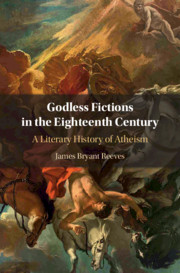Book contents
- Godless Fictions in the Eighteenth Century
- Godless Fictions in the Eighteenth Century
- Copyright page
- Contents
- Acknowledgments
- Introduction
- Chapter 1 A Complete System of Atheism: Jonathan Swift
- Chapter 2 Godless Dunces: Alexander Pope
- Chapter 3 The Limits of Self: Sarah Fielding
- Chapter 4 Gender and the Orient: Phebe Gibbes
- Chapter 5 Ecumenical Poetics: William Cowper
- Coda
- Notes
- Bibliography
- Index
Chapter 4 - Gender and the Orient: Phebe Gibbes
Published online by Cambridge University Press: 06 August 2020
- Godless Fictions in the Eighteenth Century
- Godless Fictions in the Eighteenth Century
- Copyright page
- Contents
- Acknowledgments
- Introduction
- Chapter 1 A Complete System of Atheism: Jonathan Swift
- Chapter 2 Godless Dunces: Alexander Pope
- Chapter 3 The Limits of Self: Sarah Fielding
- Chapter 4 Gender and the Orient: Phebe Gibbes
- Chapter 5 Ecumenical Poetics: William Cowper
- Coda
- Notes
- Bibliography
- Index
Summary
This chapter examines the gendered critique of atheism made by Phebe Gibbes in her sentimental epistolary novel The History of Lady Louisa Stroud, and the Honourable Miss Caroline Stretton (1764). Gibbes’s novel casts atheism as the root of both sexual violence and patriarchal abuse. On the other hand, belief in a God who will eventually right the cultural and institutional wrongs that beset eighteenth-century Englishwomen is crucial to Gibbes’s heroines’ successful resistance to the novel’s villainous male seducers. I conclude the chapter by turning to Gibbes’s more widely discussed Hartly House, Calcutta (1789), arguing that the novel calls for both Western and Eastern theists to unite against irreligion and unbelief. Gibbes’s two novels illustrate how eighteenth-century depictions of men’s sexual infidelity and imperialist violence were often couched in terms of religious faithlessness. Thus, the atheist represents a capacious figure of disdain for Gibbes, one that embodies various forms of faithlessness and is, therefore, entirely opposed to women’s well-being and the benignant ecumenical fantasy Gibbes imagines in her orientalist fiction.
- Type
- Chapter
- Information
- Godless Fictions in the Eighteenth CenturyA Literary History of Atheism, pp. 137 - 169Publisher: Cambridge University PressPrint publication year: 2020

